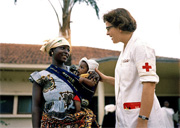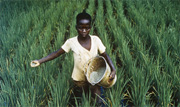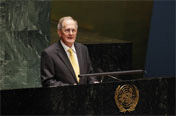
The annual Millennium Development Goals (MDGs) Report, released by Secretary-General Ban Ki-moon on 23 June 2010 in New York, reveals that the world has made huge strides in reducing extreme poverty, tackling HIV/AIDS, malaria and other diseases, and boosting access to clean drinking water, but is still not progressive enough in critical areas including improving maternal health and reducing child mortality.
“This report shows how much progress has been made. Perhaps most important, it shows that the Goals are achievable” expresses the Secretary-General in the foreword of the 2010 report. However, MDG targets number four and five, reducing child mortality and improving maternal health, have been indicated as the two slowest moving goals, and there is uncertainty as to whether these 2015 targets will be met if not given more attention.
“For too long, maternal and child health has been at the back of the MDG train,” Mr. Ban said at the 14 April 2010 launch of an initiative of a joint action plan among governments, businesses, foundations and civil society organizations for mothers in developing countries, “but we know it can be the engine of development.”
Continuing this conversation at the press conference on 23 June 2010 Mr. Ban expressed, “Mothers are the foundation of our society. When mothers are healthy families are healthy,” and “by focusing on the needs of the most vulnerable, we lay the foundation for a more sustainable and prosperous tomorrow.” Women and children in underdeveloped countries are certainly among the most vulnerable.
Current progress and needs
As indicated in the report, MDG targets number four and five set out to reduce the under-five mortality rate by two thirds, and reduce the maternal mortality ratio by three quarters while also achieving universal access to reproductive health by 2015.
Current data indicates that child deaths are falling but not quickly enough to reach the target date, with the highest rates of child mortality still found within sub-Saharan Africa. Four preventable diseases – pneumonia, diarrhoea, malaria and AIDS – account for almost forty-three percent of all deaths, and revitalizing efforts against these diseases could save millions of children.
Similarly, the world health organization’s (WHO) preliminary data on the maternal health of women shows signs of progress as well as a reduction in maternal mortality; however the rate of reduction is still short of the 5.5 per cent annual goal necessary to meet the 2015 target.
Importantly, as with the causes of infant mortality, the vast majority of these maternal deaths are avoidable. Haemorrhage has been indicated as the leading cause, at almost 40 percent for all maternal mortality, and can be prevented or managed through a range of interventions administered by skilled health-care providers and adequate equipment and supplies.
The 2010 MDG Report reveals that much progress has been made, especially as the rural-urban gap in skilled care during childbirth has narrowed. More women are receiving skilled healthcare during pregnancy than ever before, yet the numbers indicate this increase has still only resulted in one in every three rural women in developing regions receiving the recommended care during pregnancy.
Part of the discrepancy in the MDG target results, and the lagging of maternal and child health goals, is due to the fact that women and children tend to suffer disproportionately in time of crisis or hardship, as evidenced during the recent financial and economic crisis and food crisis, as well as from the impacts of climate change. The MDG resources need to reach these most vulnerable peoples in order for continued progress.
Mr. Ban announced that an estimated 60 billion dollars of extra funds is required in order for these goals surrounding mothers and children to be met. Encouraged by positive responses from world leaders on these issues, Mr. Ban indicated that it was his desire to stress this need at the G20 Summit in Toronto, taking place 26-27 June 2010.
MDG Advocacy Group to speed up progress
In continued efforts to speed the progress of the MDGs, and encourage adequate additive funding for mothers and children and all vulnerable peoples, Secretary-General Ban Ki-Moon also announced the newly established “MDG Advocacy Group” at a press conference on 23 June 2010. Mr. Ban explained that this group is made up of “a real collection of superheroes defeating poverty.”
More specifically, this Group is a collection of seventeen current and former political leaders, business people and thinkers from around the world who will work to galvanize support for achieving the Goals. Rwandan President Paul Kagame and Spanish Prime Minister José Luis Rodríguez Zapatero will co-chair the group, and the first meeting is set to take place in July, 2010, just two months before the world’s leaders will gather at UN Headquarters in New York for the September High-Level Summit also aimed at accelerating progress towards the MDGs.
“The world is still making progress in reducing poverty” Mr. Ban voiced, and “we must not fail the billions who look to the international community to fulfil the promise of the Millennium Declaration for a better world. Let us keep the promise”.
The MDG assessment report is based on data from more than twenty-five UN agencies and International organizations and indicates clearly which areas are improving and where obstacles are being faced. The world continues to make advances towards the MDGs despite the global economic downturn, but the rate of improvement remains too slow and countries must step up their commitments as the 2015 target deadline is fast approaching.
For more information: http://www.un.org/millenniumgoals/

Accountability for commitments is essential and a focus on implementing promises is urgently needed if acceleration of progress is to happen. The Development Cooperation Forum (DCF), a universal and respected forum, encourages participatory multi-stakeholder dialogue on major development cooperation issues. With a particular focus on the MDGs, this year’s forum aimed to also contribute to the forthcoming MDG Summit.
“This year’s Forum came at a critical juncture,” explains Under-Secretary-General Mr. Sha Zukang regarding the 2010 DCF. “The financial, food and energy crises have threatened development progress. In many countries, especially those in the South, the impacts of the crises will be long-lasting,” funding is imperative, “especially with competition for climate change financing.”
“Accountability, therefore, among development partners needs to be much stronger. These issues were paramount in the June Forum,” said Mr. Sha.
The 2010 DCF took place on 29 and 30 June 2010 in New York as part of the United Nations Economic and Social Council’s (ECOSOC) High-level Segment. In reviewing global trends in development cooperation, and under the theme “Development Cooperation in Times of Crises: New Commitments to Reach the MDGs,” the 2010 DCF addressed issues including the costs of the economic and financial crisis and the impact of climate change on the quantity and quality of aid.
Bringing together Ministers and high-level experts on development cooperation from governments, parliaments, local governments, civil society organizations and the private sector, the forum aimed to foster discussions on issues that can significantly improve the impact of development cooperation on the internationally agreed development goals and to give a clear political message to the United Nations High-level Plenary event on the MDGs, the “MDG Summit”, to be held in September 2010.
The objective of the DCF is to provide policy guidance and recommendations to promote and improve the impact of development cooperation. Accountability of the stakeholders is a particular focus.
The 2010 DCF and the MDGs
The Millennium Development Goals 2009 Report revealed that major advances in the fight against poverty and hunger have begun to slow or even reverse as a result of the global economic and food crises. The global economic landscape has changed fundamentally since the first DCF and the multitude of crises that have occurred have threatened to stall the projected development progress.
Mutual accountability and transparency, according to the trends and progress in the international development cooperation report of the Secretary-General, are two key ways to strengthen the International Agreed Development Goal (IADG) results. Providers need to commit to individual targets to improve aid quality, giving priority to country groups such as Sub-Saharan Africa and fragile states which are lagging behind on progress towards the IADGs. Most areas of the global partnership for development are not living up to expectations and without progress across the board development cooperation will have limited impact.
The Advisory Group of the Under-Secretary-General stresses that “the DCF has a key role as a forum for debate on whether development cooperation partners are honouring the commitments they made and achieving the results that have been agreed and clearly defined. Developing countries should hold developed countries to account on aid and aid effectiveness in the spirit of mutual accountability.”
DCF Beginnings and Expectations for Continued Progress
The DCF was established in 2005, after the World Summit mandated ECOSOC to organize the forum as a focal point within the United Nations system for consideration of global development cooperation issues. The DCF is set to continue to convene biennially.
During its first 2007-08 cycle, the DCF established a strong reputation for analysis and promoting balanced debate among stakeholder groups on development cooperation. Some key messages of the first ministerial-level DCF in 2008 were reflected in outcome documents of the Doha Review Conference on Financing for Development and Accra High-level Forum on Aid effectiveness.
President of ECOSOC, Mr. Hamidon Ali explains that “the Doha Declaration re-emphasized the importance of the DCF as the focal point within the United Nations system for holistic consideration of issues of international development cooperation, with participation by all relevant stakeholders. The DCF has a unique opportunity to act as a global, independent platform to hold all answerable for the commitments made”
In order to make the 2010 DCF successful, Mr. Sha explains that “turning our ideas into concrete actions is imperative.”
Through mutual accountability and new commitments to development goals, it is strongly believed that the MDGs can be achieved. The forum, as well as the forthcoming MDG Summit is critical in ensuring results.
For more information: http://www.un.org/en/ecosoc/newfunct/index.shtml

On 11 June, the General Assembly elected, by acclamation, H.E. Mr. Joseph Deiss of Switzerland as President of the sixty-fifth session of the General Assembly. A former leader of Switzerland who was instrumental in his country joining the United Nations eight years ago calls on Member States to return to the goals set out in the UN Charter and guide their work by the principles of peace, friendship and cooperation.
“New global challenges have also emerged – climate change, economic and financial crises, terrorism and global crime, extremism of all kinds – in addition to the perennial problems of war and poverty. They all require collective and urgent responses. More than ever before, we need to act together to be effective,” said Mr. Deiss.



